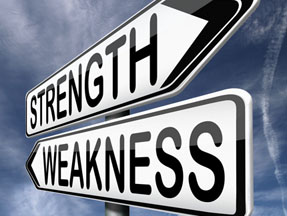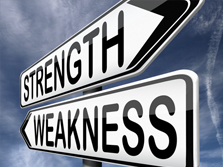 It seems that these days most interviewers want to know what your weaknesses on the job are. This is not an easy question at the best of times, but in an interview situation when you’re trying your best to impress it can be extremely trying.
It seems that these days most interviewers want to know what your weaknesses on the job are. This is not an easy question at the best of times, but in an interview situation when you’re trying your best to impress it can be extremely trying.
Unfortunately, most people fail to do themselves any favours when answering this question. Even worse, some job candidates talk themselves right out of a job.
But don’t despair. There’s good news. Below you’ll find several user-friendly strategies that will help you turn the weakness question to your advantage. In fact, with a little bit of practice you can actually make yourself look good!
Four things to always avoid:
1. Never say you don’t have any weaknesses.
2. Never say something that’s really going to hurt you.
3. Avoid transparent clichés like: “I work too hard.” Too many people use them.
4. Never offer more than one weakness (unless specifically prompted) and be as brief as possible.
Three strategies that work (choose the one that suits you best):
1. Talk about a skill that is unconnected to the job you’re going for, e.g., if you’re going for a job that does not require any knowledge in, say, Microsoft Powerpoint and Access, you can say: “Whilst I have good knowledge with Microsoft Word and Excel my knowledge with Powerpoint and Access is not up to scratch. (Notice how, in this example, you can air your strong points even though the question was about your weaknesses!).
2. Talk about something you’re in the process of learning, or wishing to learn, and make sure it’s not critical the job, e.g., “I have not entirely completed my studies in business. However, I have only x amount of time to go before I attain my qualifications. Once I finish I’m also intending to further my studies by enrolling in….” (Notice what you’re really talking about here is the fact you’re studying and are keen to keep on learning).
3. Talk about a past mistake and how you’ve learned from it, e.g., “I used to worry about not having the time to keep up to date with all the technical details in regards to the latest software changes. However, I’ve since learned that perfect knowledge in our industry is not a viable goal. And besides I am now accessing information on a need to know basis which I find to be a much more efficient way of using information.” (Notice that you’re talking about a) learning from mistakes and b) working more efficiently than you used to).




